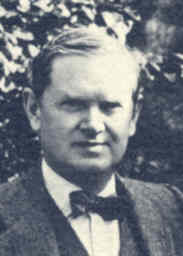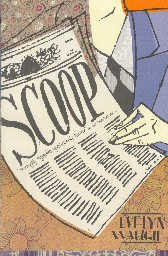William receives all his instructions from home by cable-telegram which is both terse and
expensive, very naturally a dangerous combination, but made more dangerously so by William's
naivete' about the form of telegrams. Here's a salient example of the problem where William
mistakes the sentence marker "STOP" as part of the content of the sentence, and Corker, his
competitor at this point, is not going to help him a bit.
[page 94] OPPOSITION SPLASHING FRONTWARD SPEEDIEST STOP
ADEN REPORTED PREPARED WARWISE FLASH FACTS BEAST
"I can't understand it," said William
"No?"
"The only thing that makes any sense is Stop Aden."
"Yes?" Corker's face, still brightly patterned, was, metaphorically, a blank.
"What d'you think I'd better do?"
"Just what they tell you, old boy."
Later, after Corker is told to cooperate with the Beast, he helps William to correctly decipher
cabled instructions. Meanwhile John Boot is cooling his heels in London and Mrs. Stitch hasn't a
clue as to why he's not at the war front. While back in the jungle, William is still trying to find
something to write about in Ishmaelia, about which we finally at the beginning of Book Two receive
a description.
[page 105] Ishmaelia, that hitherto happy commonwealth, cannot conveniently
be approached from any part of the world. It lies in the northeasterly quarter
of Africa, giving colour by its position and shape to the metaphor often used of
it: "the Heart of the Dark Continent." Desert, forest and swamp, frequented by
furious nomads, protect its approaches from those more favoured regions which
the statesmen of Berlin and Geneva have put to school under European masters.
An inhospitable race of squireens cultivate the highlands and pass their days in
the perfect leisure which those peoples alone enjoy who are untroubled by the
speculative or artistic itch.
As for the various Europeans who first came to Ishmaelia in the nineteenth century as
missionaries, ambassadors, tradesmen, prospectors, natural scientists, etc. our narrator tells us, "None
returned."
[page 105] They were eaten, every one of them; some raw, others stewed and
seasoned according to local usage and the calendar (for the better sort of
Ishmaelites have been Christian for many centuries and will not publicly eat
human flesh, uncooked, in Lent, without special and costly dispensation from
their bishop).
Waugh is a master of description. Here is his introduction to the beginning of the rainy
season in Ismaelia. It is reminiscent of the beginning of "Citizen Kane" when Orson Well's camera
does a close up on the lips of Kane as he says his last word, "Rosebud."
[page 116] Fifty yards distant in the annex, secluded from the main block of the
hotel by a water-logged garden, lay Sir Jocelyn Hitchcock, fast asleep. The room
was in half-darkness; door and windows were barred. On the table, beside his
typewriter, stood a primus stove. There was a small heap of tins and bottles in
the corner. On the walls hung the official, wildly deceptive map of Ishmaelia;
a little flag in the centre of Jacksonburg marked Hitchcock's present position.
He slept gently; his lips under the fine, white moustache curved in a barely
perceptible smile of satisfaction. For reasons of his own he was in retirement.
And the granite sky wept.
When William decides not to go on a boondoggle to Laku which appears on no maps and is
probably nothing more than a long-abandoned trading post in the interior of Ishmaelia, Dr. Benito
does his best to persuade him to go with the other foreign newsmen. Unexperienced in the business
in which he finds himself, William makes the right choice, the one which leads to his scoop.
[page 176] "Are you sure nothing can make you alter your decision?"
"Quite sure."
"Very well," Dr. Benito turned to go. Then he paused. "By the way, have
you communicated to any of your colleagues your uncertainty about the
existence of the city of Laku?"
"Yes, but they wouldn't listen."
"I suppose not. Perhaps they have more experience in their business.
Good night."
When William confesses his newfound love to Kätchen, Waugh's skill at description
immerses us in a rich metaphor.
[page 180, 181] "Kätchen, I love you. Darling, darling Kätchen, I love you . . ."
He meant it. He was in love. It was the first time in twenty-three years;
he was suffused and inflated and tipsy with love. It was believed at Boot Magna,
and jocularly commented upon from time to time, that an attachment existed
between him and a neighbouring Miss Caldicote; it was not so. He was a
stranger alike to the bucolic jaunts of the hayfield and the dark and costly
expeditions of his Uncle Theodore. For twenty-three years he had remained
celibate and heart-whole; land bound. Now for the first time he was far from
shore, submerged among deep waters, below wind and tide, where huge trees
raised their spongy flowers and monstrous things without fur or feather, wing
or foot, passed silently, in submarine twilight. A lush place.
After William is fired for not reporting anything, he sends his scoop to London and is quickly
reinstated in his contract. When we recall that it was only because of Mrs. Algernon Stitch's request
that Lord Copper hired a Boot, in fact, the wrong boot, William instead of John who actually had
some foreign reporting experience, this next statement by Mr. Salter is rather droll.
[page 224] "You know," he said meditatively, "it's a great experience to work
for a man like Lord Copper. Again and again I've thought he was losing grip.
But always it turns out he knew best. What made him spot Boot? It's a sixth
sense . . . real genius."
William returns to Boot Magna in triumph, and Lord Copper calls a friend to give Boot a
knighthood, but once more fate steps in and twists wheel and changes the two Boot's course. John
Boot becomes Sir John Boot, for no reason that he can think of, and Uncle Theodore gladly suffers
through one of Lord Copper's ignominious banquets enjoyed mostly by the Lord himself.
William returns to the joys of writing Lush Places for the Beast, while his great love,
Kätchen, accompanies her almost husband to Madagascar. John goes to Antarctica with a boatload
of women. Uncle Theodore gets a pension from the Beast. That's the scoop on how Boot Magna,
Boot Minima, and Boot Obscura, John, William, and Uncle Theodore figured into the Beast's plans.
The two distant cousins who never knew each other, John and William, and their Uncle Theodore
were maneuvered by Fate into switching places for each other by high mucky-mucks who allowed
tea party friends to suggest appointments and clueless underlings to implement them. Sic transit
gloria mundi a world increasingly run by those who suggest decisions and by those who
implement the decisions, while the credit goes to the one person who merely acts as the conduit for
the decisions.
~~~~~~~~~~~~~~~~~~~~~~~~~~~~~~~~~~~~~~~~~~~~~~
~^~
Any questions about this review, Contact: Bobby Matherne
~~~~~~~~~~~~~~~~~~~~~~~~~~~~~~~~~~~~~~~~~~~~~~~~~~~~~~~~~~





